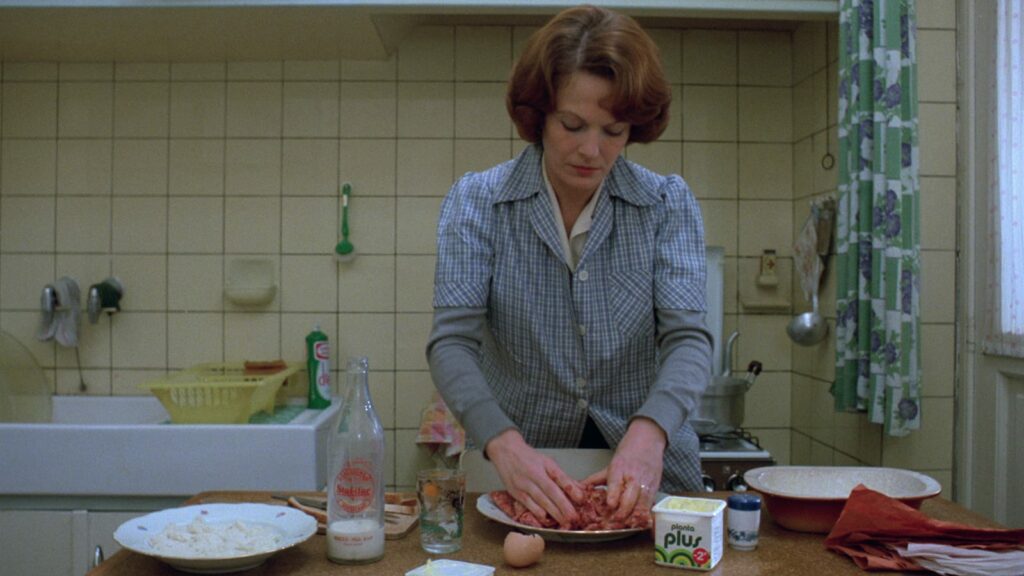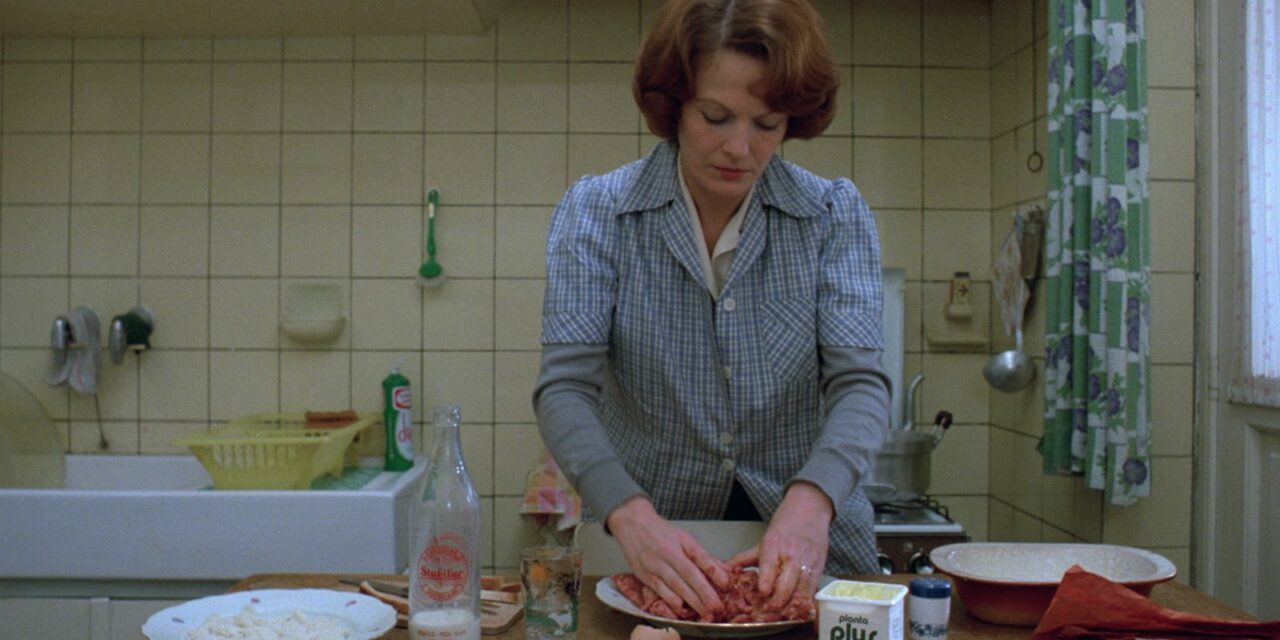As we consume art over a lifetime, our understanding of books, movies, sculpture, paintings and music becomes rigid. We’re so confident in our observations of these art forms, so sure in our personal taste, that we begin to arrive at our own definitions of not only what good art is, but we commit the creatively-constricting sin of defining what good art ought to be. However, certain pieces of art shake up our foundations, wrestle with our notions and completely subvert any and all former expectations of the medium in question. In terms of film, in my personal quest to watch all the greats, I can only count on one hand the few that truly shook my understanding of what a film is and changed my taut ideas of what a film ought to be.
Directed by Chantal Akerman, her colossal film “Jeanne Dielman, 23, quai du Commerce, 1080 Bruxelles” (1975) joins the pantheon of what I like to deem the “life-changers,” and I’m ashamed to say I’ve been avoiding it my whole life. There are certain films that have daunting reputations among cinephiles: the monstrous runtime of Jacques Rivette’s “Out 1” (1971) and the depraved subject matter of Pier Paolo Pasolini’s “Salò, or the 120 Days of Sodom” (1975) stand out as titans of cinematic controversy. In the same league, Akerman’s “Jeanne Dielman” has been feared by moviegoers for not only its structure, long runtime and sparse dialogue, but most of all because of its reputation as being … excruciatingly boring. Boring, not necessarily as an insult, but as an adjective to delineate the story which revolves around the daily monotonous routine of Jeanne Dielman (Delphine Seyrig). A widowed stay-at-home mother who diligently maintains her apartment, makes dinner for her ungrateful son (Jan Decorte) and prostitutes herself for money to fund this unglamorous lifestyle.
When a screening of the film appeared at the Plaza Theatre, I couldn’t refuse the chance to see for myself how Jeanne Dielman conducted her days: I found her schedule to be unbreakable. The film could kill a low-attention spanned, phone-addicted viewer at ten paces. It begins with what should be the most interesting aspect — her job as a sex worker — but Akerman makes it precisely as banal as when Dielman folds laundry. There are no explanations, only insinuations: A man enters her apartment, they both enter the bedroom, the room darkens letting us know time has passed, the two leave the bedroom, the man finally gives Dielman cash and lets her know he will be back next week. We don’t dwell on this task, we don’t dwell on anything; Akerman didactically takes us to the kitchen where we spend the bulk of our time with Dielman who diligently prepares dinner for her unremarkable son.
These painful meals are where I found myself sympathizing most with Dielman. Preparing meals for an ungrateful patron who not only refuses to politely compliment the hardworking chef, but won’t even raise their head to make conversation is just about one of the most debilitating parts of the human experience, a tragic experience made unavoidable for Dielman. And as we begin to memorize Dielman’s daily schedule, know every single possible aspect of her adult life, learn all the potential events, every chore, every step, we know all of it is unavoidable.

Courtesy of Olympic Films and the Criterion Collection.
One of the most revealing segments of the film comes after an agonizing dinner in which Dielman studiously helps her son memorize Charles Baudelaire’s chilling poem “The Enemy.” The sonnet deals with Baudelaire’s painful childhood, but the similarities between Baudelaire’s and Dielman’s lives are uncanny. It preaches, “Time swallows up our life, O ruthless rigor! / And the dark foe that nibbles our heart’s root / Grows on our blood the stronger and the bigger!” Baudelaire’s enemy, his “dark foe,” is unknown, but Dielman’s “dark foe” that “grows on her blood” is her own flesh and blood: a sickly sallow thankless teenager.
Of course, making dinner is not all that’s in the dedicated schedule to her son. She wakes up early, polishes her son’s shoes, makes his coffee, prepares his breakfast, dresses him for school, gives him money (hard earned from sex-work), makes his bed, goes to the market to acquire food for his dinner, returns home to prepare for a client, bathes herself, prepares dinner, eats with her son, cleans the kitchen and goes to sleep; only to wake up to start the affair once more. Tiring to read? Imagine watching it.
There are numerous other minor activities that are peppered in throughout the routine, and when Dielman has nothing to do, she sits. Akerman is not shy about showing this or any other activity to us. The camera will focus on Dielman sitting for upwards of ten minutes at a time, peeling potatoes for the same length, and when she begins to stir her coffee, only God knows how long Akerman will subject us to the repetitive mixing. But, once you lose track of time and your brain adapts to the schedule and this distinctive cinematic language, you begin to notice how it’s all on the verge of unraveling. Dielman will accidentally drop the shoe polishing brush, a break from the schedule, and a burst of dopamine fires off in your brain. When she overcooks the potatoes, it becomes a sweat-inducing catastrophe.
At some point during the film, you come to realize this is not fiction, this is the traditional life of millions of women constrained by a male dominated society and forced into a routine to maintain the lives of men. Akerman doesn’t just shed a light on the situation; like Alex DeLarge, she straps us down to a chair, pries open our eyelids and exposes us to the horror of modern day suffering: the long-established conservative role of a mother who does everything and nothing, all for her son. And, it’s not just Dielman who is subjected to this fate. The neighbor who asks Dielman to watch over her baby briefly discusses her similar schedule, and the grocer who converted her living room into a store sits with her coffee cup implying that, when the customers go, she too just sits and stirs; Dielman is not alone.
You might ask: why? What makes this movie one of the best? I will admit that watching this at home on a TV would be miserable, but watching it in a theater, experiencing it with others, makes it life-changing. Reason being: the perfect ending. The ending proposes a purpose for all the painful coffee sips, repetitive folding of laundry, tedious measuring of sugar cubes and mind-numbing mechanical peeling of potatoes. Once you’ve accepted the schedule as fate, the dryness and the monotony lulls the audience into a spell allowing Akerman to hit us with a jaw-dropping bullet to the head. Everyone in the audience: the sleepers, the dreamers, the guy on his phone, the cuddling couple, the woman who went to get a refill of popcorn six times and the rest of us, it might as well have been the whole world, we all snapped to attention. Heads tilted up and froze on what remains to be one of the most powerful ending scenes I have ever seen. I’ll leave you to find out what that is for yourself.
As a final point before I stray too far and make my own “Jeanne Dielman” with this article: best film lists come a dime a dozen. Every large publication seems to want to give us their take on where “Citizen Kane” (1941) lies in comparison to others. The only organization that makes people turn their heads is the lauded Sight and Sound poll that asks hundreds of respected film critics every decade to vote for the esteemed “100 Greatest Films of All Time” list. 2022’s Sight and Sound saw many familiar faces, but no one expected the number one position to belong to Akerman’s feminist masterpiece “Jeanne Dielman, 23, quai du Commerce, 1080 Bruxelles.” I can confidently say that regardless of whether it was placed first or last on the list, among Fellini’s “8½” (1963), Kiarostami’s “Close-Up” (1990), Yang’s “Yi Yi” (2000), Lynch’s “Blue Velvet” (1986), and many others, “Jeanne Dielman” has a place peeling potatoes with the best of them.
Liam Sherman is from Los Angeles, California, majoring in film studies and business. Some might see his endless consumption of movies, music and '90s sitcoms as typical procrastination, but he sees it as research... his family doesn’t. When he isn’t doing “research,” Liam works on his screenplays while enjoying a nice cup of tea.






